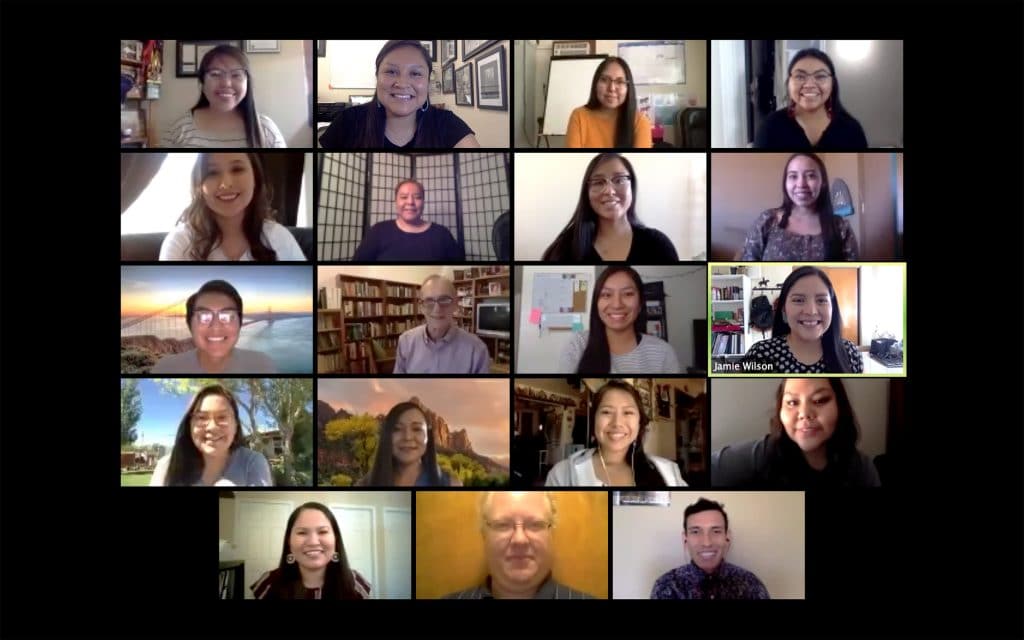In the midst of the COVID-19 pandemic and the Navajo Nation Stay at Home order, two Diné College programs are being offered virtually this summer. The academic programs provide experiential training for high school and college students and are a collaboration between Diné College and Northern Arizona University.
Supported by the Navajo Native American Research Center for Health (NARCH) and funded by a grant from the National Institute of Health’s National Institute of General Medical Sciences (award number 5S06GM123550), the Summer Research Enhancement Program (SREP) is a 10-week program for college students, held this summer from May 26 to July 31. The Indigenous Summer Enhancement Program (ISEP) is a one-week program designed for high school students.
ISEP high school program
This year, ISEP has seven peer mentors—all former summer program students. Last year, 15 students attended ISEP.
Heather Dreifuss, director and instructor for ISEP and NAU staff, said the recruitment drive coincided with the start of the COVID-19 pandemic.
“Usually we visit high schools and local dorms to recruit high school participants, though we could not this year,” Dreifuss said. “This strategic recruitment time and the move to online may have affected enrollment, but we do not have a specific mechanism in place to answer these questions accurately at the moment.”
Though the quick pivot to an online summer program has been challenging to faculty, staff and students, some of the new technological changes may be included in next year’s program. Flipped classrooms, where students take a more active role and instructors serve as facilitators, allow students to experience even more hands-on, student-led collaboration and group work.
“The intent of ISEP and SREP is to introduce and engage high school and undergraduate students to public health and health research. The goal is to build the Navajo Nation’s public health workforce,” said Nicolette Teufel-Shone, associate director of NAU’s Center for Health Equity Research and co-principal investigator of the Navajo NARCH. “The SREP and ISEP faculty, staff and students have demonstrated the essential skills in public health, the ability to adapt to change and to solve problems. Their resilience and ingenuity during this adversity reflects their commitment to public health, the continued well-being of the Navajo people and continued education of future leaders.”
SREP and ISEP have several instructors who are or were Northern Arizona University students in the master of public health program or in the NAU College of Health and Human Services. Alumnae Marissa Tutt and Kalvina Belin, and NAU master in public health students Jordin Aguilar and Hosava Kretzmann are an integral part of the summer program and lead the SREP daily icebreakers and stretch breaks for students and staff.
“The icebreakers not only help us get up from our chairs and move around since we’re on our devices all day, they also give us an opportunity to learn more about each other,” Belin said. “So far, we’ve been having fun with it and it definitely brings a sense of belonging and comfort.”
Belin attended SREP as a student during her undergraduate program and said she enjoys returning as an instructor.
“I finally have the opportunity to give back and help with the program,” Belin said. “I’m grateful to be in this position and to work with a team that works hard.”
SREP program
Offered for 15 years, the SREP program typically engages students in three weeks of classroom instruction on the Diné College Tsaile campus, then coordinates six-week hands-on internships with different agencies and mentors, generally located on the Navajo Nation, that provide students with practical experience in data collection and analysis in a health-related program in a community setting.
In the final week, students usually return to the Tsaile campus to review their experience with their instructors, analyze the data and provide a presentation on their work to not only their peers and faculty but also their internship mentors.
This year, all in-person activities have been eliminated, and students will not work directly with any public health organizations on the Navajo Nation. All lectures at the beginning of the program were through Zoom, including the opening prayer by Avery Denny, medicine man and a staff member at Diné College.
“We have added a weekly talking circle,” said Carmella Kahn, Diné College faculty and instructor for both SREP and ISEP and an adjunct faculty member in the Health Promotion Science Department at the University of Arizona. “This is to allow students to reflect on their experience in the program and to talk about their experiences outside of the program. COVID-19 has affected many communities across the Navajo Nation, which can make taking a summer program really difficult, but these students are working hard and attending lectures every day.”
This year, SREP instructors and staff are using a variety of online programs to create students’ experience––Blackboard for course materials, Zoom for lectures and Slack for announcements and online discussions. Through Zoom, participants are still able to join in group discussions and other student engagement activities. Both programs are providing laptops or internet connectivity for students who need them.
Instructors pre-record approximately 20-minute lectures, and each student has a mentor to assist them with questions and homework assignments. The schedule incorporates guest speakers who present information on the COVID-19 virus, data collection methods, intervention strategies and mental health to address COVID-19-related issues.
Students will be completing their final research projects in three different groups and will submit their research protocol to the Diné College Institutional Review Board for approval. They will complete data analysis and present their final projects during the last week of SREP in July.
The SREP program has nine attendees this year, slightly lower than the usual 15 students.
According to the faculty, SREP has a demanding schedule and the shift to online instruction makes the program more challenging. In the past, more non-Diné College students applied and were accepted, but due to COVID-19 restrictions there are a limited number of students who applied or were able to commit to being online for the summer.



